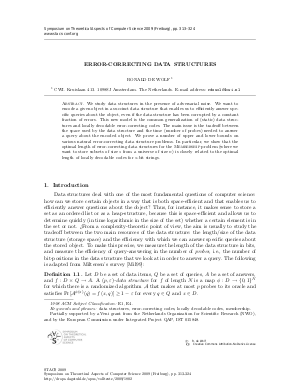Error-Correcting Data Structures
Author Ronald de Wolf
-
Part of:
Volume:
26th International Symposium on Theoretical Aspects of Computer Science (STACS 2009)
Part of: Series: Leibniz International Proceedings in Informatics (LIPIcs)
Part of: Conference: Symposium on Theoretical Aspects of Computer Science (STACS) - License:
 Creative Commons Attribution-NoDerivs 3.0 Unported license
Creative Commons Attribution-NoDerivs 3.0 Unported license
- Publication Date: 2009-02-19
File

PDF
LIPIcs.STACS.2009.1802.pdf
- Filesize: 184 kB
- 12 pages
Document Identifiers
Subject Classification
Keywords
- Data structures
- Error-correcting codes
- Locally decodable codes
- Membership
Metrics
- Access Statistics
-
Total Accesses (updated on a weekly basis)
0Document
0Metadata
Abstract
We study data structures in the presence of adversarial noise. We want to encode a given object in a succinct data structure that enables us to efficiently answer specific queries about the object, even if the data structure has been corrupted by a constant fraction of errors. This new model is the common generalization of (static) data structures and locally decodable error-correcting codes. The main issue is the tradeoff between the space used by the data structure and the time (number of probes) needed to answer a query about the encoded object. We prove a number of upper and lower bounds on various natural error-correcting data structure problems. In particular, we show that the optimal length of error-correcting data structures for the {\sc Membership} problem (where we want to store subsets of size $s$ from a universe of size $n$) is closely related to the optimal length of locally decodable codes for $s$-bit strings.
Cite As Get BibTex
Ronald de Wolf. Error-Correcting Data Structures. In 26th International Symposium on Theoretical Aspects of Computer Science. Leibniz International Proceedings in Informatics (LIPIcs), Volume 3, pp. 313-324, Schloss Dagstuhl – Leibniz-Zentrum für Informatik (2009)
https://doi.org/10.4230/LIPIcs.STACS.2009.1802
BibTex
@InProceedings{dewolf:LIPIcs.STACS.2009.1802,
author = {de Wolf, Ronald},
title = {{Error-Correcting Data Structures}},
booktitle = {26th International Symposium on Theoretical Aspects of Computer Science},
pages = {313--324},
series = {Leibniz International Proceedings in Informatics (LIPIcs)},
ISBN = {978-3-939897-09-5},
ISSN = {1868-8969},
year = {2009},
volume = {3},
editor = {Albers, Susanne and Marion, Jean-Yves},
publisher = {Schloss Dagstuhl -- Leibniz-Zentrum f{\"u}r Informatik},
address = {Dagstuhl, Germany},
URL = {https://drops.dagstuhl.de/entities/document/10.4230/LIPIcs.STACS.2009.1802},
URN = {urn:nbn:de:0030-drops-18024},
doi = {10.4230/LIPIcs.STACS.2009.1802},
annote = {Keywords: Data structures, Error-correcting codes, Locally decodable codes, Membership}
}
